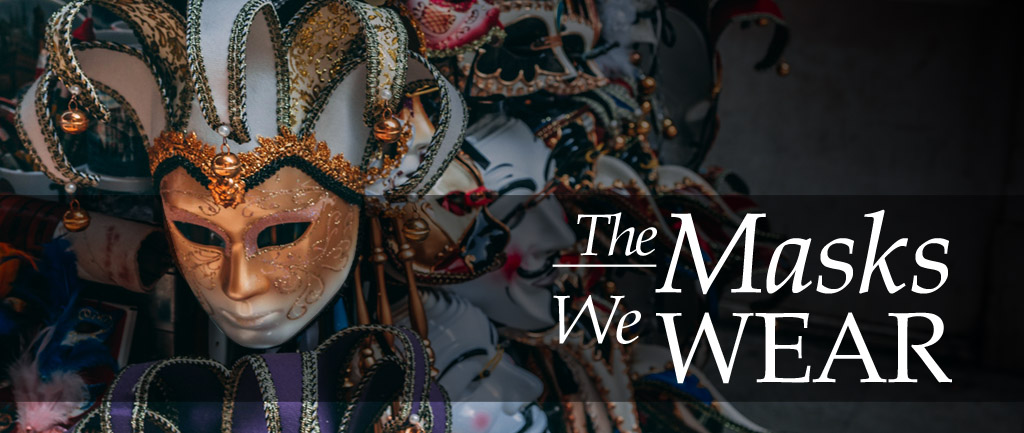 More than one conversation that I had in the past week was about wearing masks. For some of us, our behavioral style can shift depending on the people we are around. This may not always be about hiding ourselves, but an unconscious code-switching that adapts our communication to whoever we are with.
More than one conversation that I had in the past week was about wearing masks. For some of us, our behavioral style can shift depending on the people we are around. This may not always be about hiding ourselves, but an unconscious code-switching that adapts our communication to whoever we are with.
We probably don’t think about this adaptive behavior unless it’s for work, or until we meet someone new. First meetings can be nerve-wracking depending on the stakes we’ve got on them. This can be especially stressful for those who suffer from anxiety or low self-esteem; for example, I used to rehearse lines before I could pick up a phone for anything. I was certain that if I fumbled my words, the other person would be convinced that I was incompetent, and THIS WAS BAD.
In 2005, a dot com I worked for decided to shift my webmonkey team part-time into customer support, where the company was shorthanded. I nearly had panic attacks when they put us on the phones, jumping every time the phone on my desk rang. Even though we had training, it took me massive effort to speak without shaking. Things got better over months, but I still had to quit after a year—half my working days, I would come home with a headache, painful shoulders, or both.
Cut to two years later, I was in my job as a historical guide, getting better at talking to people, but still getting shoulder aches that turned into agonizing headaches.

“Lady Luck” in watercolours, 2014.
I didn’t yet have the awareness that I was somatizing my struggles with work into my physical symptoms. No matter how much I tried to relax my shoulders, I found that my “natural” physical state was raising them up in a hunch.
What I know now is my physical posture reflected my psychological state: I needed to do everything perfectly, else I would attract criticism, shame or humiliation, jeopardizing my already crappy self-esteem around being a failed artist and human being with a 3.94 GPA who somehow kept finding herself in unorthodox, eh-paying jobs. My shoulders were perpetually tense and raised to protect myself from attack.
The mask I was determined to wear was that of competence and “normality”. It made some sense: I got interrogations and flack for making art (it was unproductive and below my intelligence), so I learned to hide and do more mainstream things to fit in. And I set ridiculous standards too; needing to be the best and perfect because otherwise, there was a subconscious tape that my mind replayed: My mother mocking and incredulous at my childhood mistakes and misunderstandings, no matter how natural they were for my age.
Without realising it, I’d grown up insecure and jealous because what I internalised was how wrong I was, that other children were better than me for traits or behaviors that I didn’t have. I’d also learned that appearances were everything.
(Not the right lessons for anyone to learn, and it’s still taking me effort to undo.)
Masks are about how we want to appear to others
Sometimes we want to look like our own ideal. Sometimes we want to look like someone else’s ideal. People-pleasers aim for the latter, some going so far as to suppress their real wants and emotions, often out of fear and the need for acceptance. We’re more prone to this if we rarely experienced being accepted for ourselves.
Recent adventures and discussions about dating have been educational. Here’s what I got:
If we put on masks in front of the people from whom we’re desperate for acceptance, we’ll still know on some level that the “love” we receive for wearing that mask is conditional.
It makes little difference if it was the other person who demanded that mask, or if we ourselves put it on out of habit or fear. If we do not feel safe with someone else in our truest, most vulnerable state, what we have is a relationship based on appearances. We may need a number of such relationships to function in society, but these should not be given more importance than they deserve.
We shouldn’t be depending on appearance-based relationships for our emotional support or sense of self-worth.
(For people who grew up under narcissists, for whom appearances are everything, it can take an even longer time to figure out this toxic BS.)
I know my true, afraid-to-be-judged and vulnerable self has the following traits:
- Prone to swearing, for punctuation and emotional release
- Loves pretty and beautiful things
- Loves clever things, and people who make and say clever things
- Loves learning, curiosity, dark humor, and mystery
- Likes dress-up, sarcasm, and adrenaline occasionally
- Likes and wants physical affection from the right people
(This is groundbreaking for an Asian to admit, so y’all better appreciate this!) - Is a hippie who believes everyone deserves their basic needs met
- Still feels insecure and “not enough”
- Needs to feel competent and on top of things, but isn’t always
- Needs to feel heard and appreciated. (But, who doesn’t?)
Try writing your own list
Mine didn’t take me long. I just needed to think about what parts of myself I usually hesitate before revealing to people.
Once you have your list, figure out who you know accepts everything on that list about you. I personally feel you need at least one person who’s all-in, even if it’s “just” your therapist.
Assuredly you’ll have friends and family who may only know and accept part of your list. You may “get along”, but they aren’t aligned with you: They may have expressed that they think pretty things are frivolous, swearing is for degenerates, feminism is evil, and that all public displays of affection are harmful and shameful, etc.
So we put on different masks and behaviors in front of different people. In your relationships of choice, ask yourself if you present these fronts out of respect (and if so, is it reciprocal?), out of a need for acceptance (how real is it, if it’s based on appearances and conformity?) or out of fear—the irrational need to be liked by everybody at all times. Sometimes we project our fears and think we will be rejected for our true selves when we actually won’t.
More awareness should lead us to edit our choice of company and lessen our people-pleasing, ultimately to stop self-minimizing and self-sabotage. When we learn the true things about ourselves that are non-negotiable, we may wear our masks less and less often, and start finding people who accept us as we are.
Masks should never get too comfortable.

Never in my 53 years have I read something that described my life to a T! Your list, IS my list! Thank you so much. One additional thing I have on mine though is Procrastination which I recently learned was emotional. Again, thank you.
I learned that recently too! Glad that this post connected, thanks for leaving your comment :)